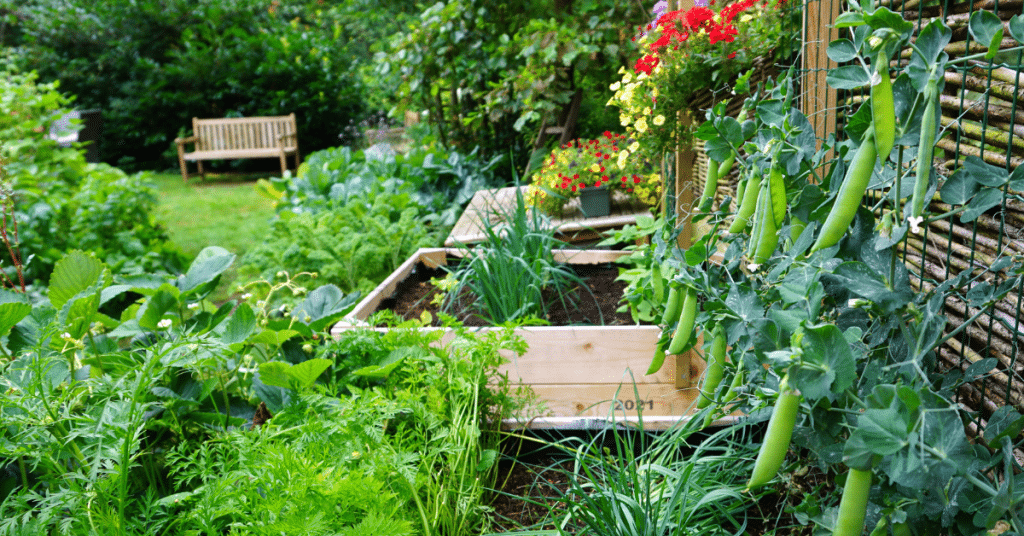Creating an Eco-Friendly Oasis: Designing Your Organic Garden

Gardening is not just about growing beautiful flowers or delicious vegetables; it's an opportunity to impact the environment positively. Designing an eco-friendly garden can create a thriving oasis that benefits nature and your well-being. This article will explore the importance of an eco-friendly garden and how to incorporate organic practices and plan a garden to create your green haven.
The Importance of an Organic Garden
Imagine buzzing into a garden with life butterflies flitting from flower to flower, bees diligently pollinating, and birds singing sweet melodies. An eco-friendly garden provides a tranquil escape and plays a vital role in preserving our planet. By embracing organic gardening, you can contribute to a healthier ecosystem and combat climate change challenges while producing chemical-free food.
Chemical-free gardening is at the heart of an eco-friendly oasis. Traditional gardening practices often rely on synthetic fertilizers, pesticides, and herbicides, which can harm beneficial insects and pollinators, and even contaminate water sources. Organic gardeners, on the other hand, focus on soil organic matter, encouraging natural pest control and promoting biodiversity.
When you create an organic garden, you invite a variety of beneficial creatures to take up residence. These include ladybugs, spiders, and predatory insects that help control pests naturally, reducing the need for harmful chemical interventions. By avoiding chemical fertilizers, you allow beneficial insects to flourish, creating a balanced ecosystem that promotes the health of your plants.
Moreover, an eco-friendly garden embraces the power of composting. Instead of sending kitchen scraps and yard waste to landfills, you can transform them into nutrient-rich compost. Adding organic matter and organic soil enhancer to your soil improves its structure, enhances water retention, and provides essential nutrients to your plants, all while reducing waste and greenhouse gas emissions.
An organic garden also contributes to biodiversity conservation. By selecting native plant species, you provide food and shelter for local wildlife, such as birds, butterflies, and bees. This, in turn, helps maintain the delicate balance of our ecosystems and supports the survival of these essential pollinators.
As gardeners, we have the power to create a haven for nature in our own backyards. An eco-friendly garden not only provides a sanctuary for plants and animals but also offers a sanctuary for us-a place to unwind, connect with nature, and find solace from the hectic world outside.
Principles of Organic Garden
Designing an organic garden involves embracing principles and techniques that prioritize the health of your plants and the environment. Following these guidelines can create a thriving and sustainable garden that flourishes with life. Let's explore the key principles of designing an organic garden:
1. Soil Health:
The foundation of a successful organic garden lies in healthy soil. Start by conducting a soil test to determine its pH level and nutrient content. Amend the soil with organic matter such as compost, well-rotted manure, or leaf mold to improve soil structure and soil fertility. Healthy soil teeming with beneficial microorganisms provides a solid base for your plants to thrive.
2. Organic Fertilizers:
Avoid synthetic fertilizers and opt for organic alternatives. Organic fertilizers, such as compost, seaweed extract, or fish emulsion, release nutrients slowly and enrich the soil over time. They provide a balanced and sustainable approach to feeding your plants, promoting healthy growth without harmful chemical runoff.
3. Selecting Organic Seeds and Plants:
Choose organic seeds and plants that are free from genetic modifications and have been raised without the use of synthetic pesticides or fertilizers. Look for heirloom or open-pollinated varieties, which preserve genetic diversity and often exhibit exceptional flavor and adaptability to your specific climate.
4. Companion Planting:
Embrace the concept of companion planting, where certain plants are grown together to enhance each other's growth and repel pests. For example, planting marigolds among your vegetables can deter pests with their natural fragrance, while herbs like basil or dill can attract beneficial insects that prey on garden pests.
5. Natural Pest Control:
Encourage natural pest control by attracting beneficial insects and birds to your garden. Plant flowers that provide nectar and pollen for pollinators, and install bird feeders or birdhouses to attract insect-eating birds. Additionally, consider using physical barriers, like row covers or netting, to protect your plants from pests and plant diseases.
6. Weed Management:
Combat weeds without resorting to chemical herbicides. Mulching with organic materials, such as straw or wood chips, helps suppress weeds by blocking sunlight and conserving soil moisture. Regular hand-weeding and specialized weeding tools are also effective organic strategies for weed control.
7. Water Conservation:
Efficient water usage is essential in an organic garden. Consider installing drip irrigation systems or using soaker hoses to deliver water directly to the plant roots, minimizing evaporation. Collect rainwater in barrels or cisterns to reduce reliance on municipal water sources and provide your plants with chemical-free hydration.
By incorporating these principles into your vegetable garden design, you'll create an organic oasis that is visually stunning and promotes the health and well-being of your plants, beneficial insects, and the surrounding environment. In the next section, we'll explore practical steps to implement sustainable practices in your organic garden, taking your eco-friendly oasis to the next level.
Implementing Sustainable Practices in Your Organic Garden
Creating an eco-friendly oasis goes beyond organic gardening practices. It's about embracing sustainable principles and incorporating environmentally friendly techniques into every aspect of your garden design. Here are practical steps to help you implement sustainable practices in your organic garden:
1. Planning for Sustainability:
Consider sustainability from the very beginning of your garden design. Choose native plants that are well adapted to your region's climate and require minimal water and maintenance. Incorporate perennials, which come back year after year, reducing the need for replanting. By selecting sustainable elements from the start, you'll create a garden that thrives naturally in its environment.
2. Recycling and Repurposing for Your Organic Garden:
Reduce waste and give new life to old materials by recycling and repurposing in your garden. Use reclaimed bricks or stones for pathways, repurpose wooden pallets into raised beds, or transform old containers into planters. Finding creative ways to reuse materials, minimize waste, and add a unique touch to your garden design.
3. Harnessing Renewable Energy :
Consider incorporating renewable energy sources into your garden design. Install solar-powered garden lights to illuminate pathways, seating areas, or decorative features. Use solar-powered water pumps for fountains or small water features. By harnessing the sun's power, you can create an eco-friendly garden with minimal environmental impact.
4. Composting and Waste Reduction:
Continue the cycle of sustainability by composting kitchen scraps, yard waste, and plant trimmings. Compost provides nutrient-rich organic matter that can be added to the soil, improving its fertility and structure. Additionally, practice waste reduction by properly disposing of garden-related materials, such as plastics or hazardous chemicals, in an environmentally responsible manner.
5. Creating Wildlife Habitats for Your Organic Garden:
Transform your garden into a haven for wildlife by creating habitats that support various species. Install birdhouses or nesting boxes to attract birds, provide water sources such as birdbaths or small ponds, and plant native flowers with nectar and pollen for butterflies and bees. Promoting biodiversity and providing shelter, food, and water encourage a thriving ecosystem within your garden.
By implementing these sustainable practices, you'll create an organic garden that benefits the environment and becomes a source of inspiration and connection with nature. Remember, your garden is not just a collection of plants; it's a living testament to your commitment to a greener, more sustainable future.
Creating an eco-friendly oasis through organic gardening requires patience, dedication, and a genuine love for the environment. As you embark on this journey, your garden will reward you with beautiful blooms, bountiful harvests, and the satisfaction of knowing that you positively impact the world.
Now that you have the knowledge and garden tools to design your organic garden, it's time to get your hands dirty and focus on organic produce.
